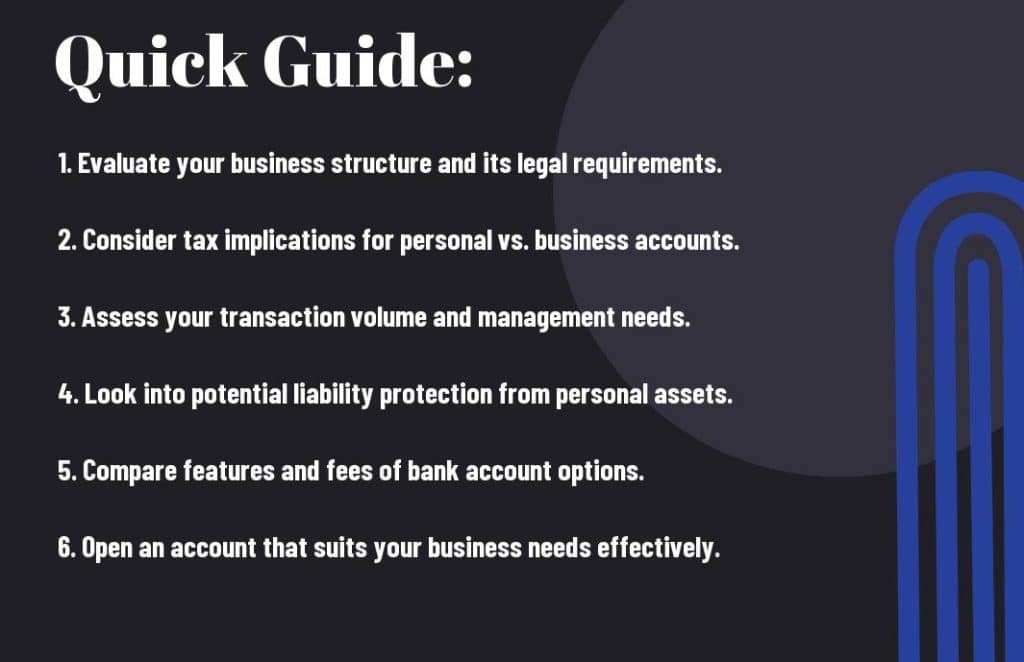Do I need a separate business bank account in Australia?
Most entrepreneurs and business owners in Australia face the important decision of whether to open a separate business bank account. Having a dedicated account can simplify your financial management and enhance your professionalism, making it easier to track income and expenses while safeguarding your personal finances. In this guide, you’ll explore the benefits of establishing a separate account and how it can support your business’s growth and compliance in Australia. Let’s investigate into whether this step is necessary for your unique situation.
Key Takeaways:
- Legal requirements: In Australia, if you are operating as a company or trust, it is mandatory to maintain a separate business bank account.
- Financial management: A dedicated business account simplifies tracking income, expenses, and tax obligations, providing better clarity for your finances.
- Professionalism: Using a business bank account enhances your credibility with customers and suppliers, reinforcing your business identity.

Types of Business Bank Accounts
A variety of business bank accounts are available in Australia to suit different needs. Each type offers unique features that can aid in managing your finances effectively. Below is a comparison of the common types:
| Account Type | Features |
|---|---|
| Standard Business Account | Everyday transactions and payments |
| High-Interest Account | Higher interest rates for savings |
| Transactional Account | Facilitates frequent transactions |
| Online Savings Account | Accessible savings with competitive rates |
| Enterprise Account | For larger businesses with multiple needs |
Thou can determine the best account for your business based on how you operate and manage your finances.
Standard Business Accounts
Little do many realize, a standard business account is the foundation of your banking needs. They facilitate daily transactions, such as deposits, withdrawals, and transfers, making it easier to handle operational costs. You can also typically access features like online banking and business debit cards. This type of account is necessary for maintaining clear financial records and ensuring smooth business operations.
High-Interest Accounts
Some business owners prefer high-interest accounts for their savings. These accounts often provide better interest rates compared to standard accounts, allowing your funds to grow while remaining accessible. You can deposit funds whenever needed and still generate interest on your savings.
Bank relationships with high-interest accounts can also provide additional benefits, such as linked products or financial advice. If you have substantial funds, this type of account can significantly increase your interest earnings, making it an attractive option for growing your business savings.
Transactional Accounts
Banking with transactional accounts allows you to manage your daily business needs efficiently. These accounts are designed to handle frequent transactions, making them suitable for businesses that require regular payment processing. They often come with features such as overdraft protection, business debit cards, and access to mobile banking.
Accounts of this type are optimized for active usage. They enable you to conduct a high volume of transactions without incurring excessive fees. Understanding the benefits of transactional accounts can lead to better cash flow management and help streamline your business operations effectively.
Factors to Consider When Opening an Account
Some crucial factors to consider when opening a business bank account include:
- Types of accounts available
- Banking features and digital services
- Accessibility and branch locations
- Customer service and support options
- Account minimums and ongoing requirements
The right account can help streamline your business operations.
Business Structure
When choosing a business bank account, consider your business structure, as different setups, such as sole traders, partnerships, or companies, may have different banking needs and requirements.
Transaction Volume
Transaction volume is another important aspect to evaluate when selecting your business bank account.
Consider how often your business will be conducting transactions, as higher volumes may require an account that accommodates unlimited or higher transaction limits without incurring additional fees. This can save you from unexpected costs and keep your finances running smoothly.
Fees and Charges
Some accounts come with a variety of fees and charges that can impact your business finances.
Plus, be proactive in understanding all potential fees associated with your account, including monthly account-maintenance fees, transaction fees, and costs for additional services. Selecting an account with minimal fees can significantly benefit your bottom line, especially as your business grows.
Pros and Cons of Having a Separate Business Account
Many entrepreneurs debate whether to open a separate business bank account. Understanding the advantages and disadvantages can help you make the right choice for your venture. Below is a summary of the pros and cons of having a separate business account:
| Pros | Cons |
|---|---|
| Clear financial separation | Additional maintenance fees |
| Simplified accounting | Increased paperwork |
| Better insights into cash flow | Time spent managing two accounts |
| Professionalism with clients | Potential for confusion between personal and business funds |
| Access to business loans and credit | May require minimum balance |
Advantages
Pros of having a separate business account include clearer financial separation between your personal and business finances, which simplifies tax preparation and accounting. Furthermore, it provides you with better insights into your business’s cash flow, allows for greater professionalism when dealing with clients, and gives you access to business-specific financial products like loans and credit facilities.
Disadvantages
Even though there are clear advantages, a separate business account also comes with its downsides.
Disadvantages often include additional maintenance fees, as many business accounts charge monthly or transaction fees. You may also face increased paperwork, as you’ll need to manage two separate accounts, which can consume your time and create confusion between personal and business funds if not kept organized. Additionally, some banks require you to maintain a minimum balance, which could limit your cash flow flexibility.
Tips for Choosing the Right Bank
For selecting the most suitable bank for your business, consider various key factors:
- Account fees and charges
- ATM access and branch locations
- Online and mobile banking features
- Customer service and support options
- Integration with accounting software
Assume that being thorough in your evaluation will lead to better financial management for your business.
Research and Compare Options
There’s a plethora of banking options available, making it necessary to research and compare them effectively. Below is an outline of considerations to assess:
| Factor | Details |
| Fees | Monthly maintenance fees, transaction charges |
| Interest Rates | Savings rates and borrowing costs |
| Services | Business loans, credit cards, payment solutions |
Read Customer Reviews
Read through customer reviews to gain insight into people’s experiences with different banks. These reviews often highlight both strengths and weaknesses, providing a clearer understanding of what to expect.
Compare multiple customer reviews across various platforms, focusing on feedback related to customer service, reliability, and features. This information can guide you in making a well-informed decision, aligning your needs with the bank’s offerings.
Look for Additional Features
Features can make a banking experience more efficient and user-friendly. Pay attention to the following: transaction limits, payment processing options, and reporting tools.
Understanding additional features can significantly enhance your banking experience. For instance, some banks offer integrated tools that help you manage invoices or generate financial reports, streamlining your business operations.
Step-by-Step Guide to Opening a Business Bank Account
Unlike personal bank accounts, opening a business bank account involves several important steps that ensure your business finances are organized and compliant. Follow this structured approach to make the process easier:
| Step | Description |
|---|---|
| Gather Required Documentation | Collect the necessary papers to prove your business identity. |
| Complete the Application Process | Fill out the bank’s application form with the required details. |
| Fund Your Account | Make an initial deposit to activate your account. |
Gather Required Documentation
Any business entity, whether a sole trader or a corporation, must prepare specific documentation to open a bank account. This typically includes your business name registration, ABN (Australian Business Number), identification such as a driver’s license or passport, and proof of address. Each bank may have its own requirements, so it’s beneficial for you to check with your chosen financial institution beforehand.
Complete the Application Process
Required details in the application form will include your business structure, contact information, and identification details of the individuals involved in the business. Ensure that all the information is accurate to expedite the approval process.
With your documentation in hand, visit your chosen bank or their website to access the application form. Take your time to fill it out thoroughly and double-check for any errors before submission. This step is vital for ensuring there are no delays in setting up your account.
Fund Your Account
An initial deposit is usually necessary to officially activate your business bank account. Each bank may have different minimum deposit requirements, so you should be aware of these details.
Bank policies often dictate the amount needed to open the account. Ensure you have the required funds ready in order to complete the process promptly. This deposit is also a good opportunity for you to establish a positive banking relationship with your financial institution from the start.

Common Mistakes to Avoid
After establishing your business, it’s easy to overlook the finer details, particularly when it comes to banking. You should be mindful of common mistakes that many business owners make, as they can lead to financial confusion and potential legal issues. By being aware of these pitfalls, you can ensure your business finances are managed effectively and in compliance with tax regulations.
Mixing Personal and Business Finances
Finances that are intertwined can lead to a myriad of complications, including difficulty tracking expenses and potential tax issues. By mixing personal and business funds, you risk losing a clear picture of your company’s financial health, making it harder to prepare accurate reports when needed. Keeping them separate allows for greater clarity and peace of mind in managing your business.
Ignoring Fees and Charges
While running your business, it’s easy to overlook the various fees and charges associated with your business bank account. These hidden costs can add up quickly, impacting your bottom line. Make sure to analyze your banking statements regularly and understand the fee structures in place.
Fees related to account maintenance, ATM usage, and transaction charges can accumulate over time, potentially derailing your financial planning. By staying informed about what you’re being charged and seeking a banking solution with minimal fees, you can allocate more resources toward your business growth.
Not Maintaining Accurate Records
Little oversight in maintaining records can lead to significant discrepancies down the line. Accurate record-keeping is imperative in tracking your income and expenses, ensuring you remain organized and compliant during tax season. Poor record management may complicate your financial reporting and decision-making.
With diligent record-keeping practices, you can easily monitor your business’s financial health and identify areas for improvement. Good records provide you with imperative insights that will aid in budgeting, forecasting, and strategic planning—setting your business up for future success.
Summing up
Summing up, if you’re running a business in Australia, having a separate business bank account is highly beneficial for managing your finances, simplifying tax reporting, and enhancing your credibility with clients. It helps you keep personal and business expenses distinct, providing clearer financial insights and protecting your personal assets. Moreover, many banks offer business accounts with tailored services to meet your specific needs. By establishing a separate account, you ensure better organization and efficiency in your financial management.
Q: Do I need a separate business bank account for my sole proprietorship in Australia?
A: While it’s not legally required for sole traders to have a separate business bank account, it is highly recommended. Separating your business and personal finances helps streamline your accounting processes, makes it easier to track income and expenses, and can simplify your tax reporting. Additionally, having a dedicated business account enhances your professionalism and credibility with clients and suppliers.
Q: What are the benefits of having a business bank account in Australia?
A: Opening a business bank account in Australia offers several advantages. Firstly, it allows you to maintain a clear distinction between personal and business finances, which is crucial for accurate bookkeeping. Secondly, business accounts may provide features tailored to business needs, such as overdraft facilities, higher transaction limits, and access to business loans. Furthermore, some banks offer tools for cash flow management and other resources that can support your business growth.
Q: How can I choose the right business bank account in Australia?
A: When dicking out a business bank account in Australia, consider factors such as fees, transaction limits, and the range of available services. Look for accounts that offer features like online banking, mobile access, and integration with accounting software. Additionally, compare customer service options and any business-related perks, such as discounts on merchant services or access to financial advice. It may also be helpful to consult with other business owners or financial advisors for recommendations.
Source article: https://smallbiztoolbox.com.au/do-i-need-a-separate-business-bank-account-in-australia/









